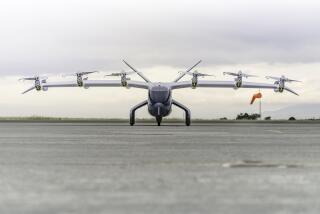NEWS AND BRIEFS : Air Traffic in Europe Faces Crowded Skies
- Share via
A “radical reorganization” of the way in which Western Europe manages its air space is “urgent and essential” if the region’s air transport system is not to be brought to a near standstill in the late 1990s because of congestion, according to a report released this month.
The study, commissioned by the International Air Transport Assn., said the number of airline passengers carried each year in Europe will almost double, from 267 million in 1988 to 500 million by the year 2000. By 2010 that figure could reach 740 million.
The IATA report called for a unified Europe-wide air traffic control system instead of the 22 or 23 systems operating now, as well as reorganization of air corridors, expansion of airports and other changes.
Unless improvements are made, 16 of 27 major airports in Western Europe will not be able to meet forecast demand by the year 2000, the study predicted. These airports, in order of worst potential problems, are: Madrid, Frankfurt, London Gatwick, London Heathrow, Barcelona, Milan Linate, Duesseldorf, Dublin, Stockholm Arlanda, Athens, Palma de Majorca, Geneva, Manchester, Marseilles, Copenhagen and Hamburg.
Luxury rail travel is being offered between Los Angeles and the San Francisco Bay Area on board the privately owned California Sun Express double-decker dome cars of Amtrak’s Coast Starlight trains.
The new service operates daily between Los Angeles and Oakland. Organized sightseeing tours with an overnight stay at San Luis Obispo and Morro Bay are also available.
The upper level on each of the cars seats 64 passengers in upholstered seats with brass handrails, oak tables and plush carpeting. All passengers have seats in the full-length upper dome, with unobstructed 360-degree views.
The lower level features a 22-seat dining salon with white linens, imported china, French stemware and silver flatware. All meals are prepared from scratch by a chef in the stainless steel electric kitchen. Brunch and dinner, featuring a California-style menu, are served on the train.
The one-way fare between Los Angeles and San Luis Obispo is $99.50; from Los Angeles to Oakland without a stopover, the one-way fare is $179. Two-day, one-night packages are available starting at $379.
For more information, contact Princess Railtours, 2815 2nd Ave., Suite 400, Seattle, Wash. 98121, toll-free (800) 835-8907.
Parisians and visitors to the city in a few years will be able to ride the “boa.”
Transport officials in Paris this month unveiled the Metro of the future, a 46-meter experimental prototype that will start test runs in June.
The new train has none of the old separations between cars but, like its namesake the boa constrictor, is one long, continuous train that can hold up to 890 passengers--5% more than those now in use.
If tests prove successful, the city will order enough to replace the current 1,400 metro trains between the years 1998 and 2010, when the present cars will average 30 years old.
A California company’s proposed “Third World in America” tour has tourism promoters in Virginia, West Virginia, Tennessee and Kentucky hopping mad.
For $500, Global Exchange of San Francisco, a nonprofit research ands action center specializing in “awareness” tours to such countries as Haiti, the Dominican Republic, South Africa and Brazil, will take participants on an excursion through Appalachia June 17-25 to see impoverished families, crumbling coal mining towns and appliance-strewn streams.
“I suggest that those folks could save a lot of money and get a great dose of Third World reality simply by walking through the barrio in Los Angeles,” West Virginia Commerce Commissioner John Brown said.
“If you’re looking for poverty and environmental problems, yes, you can find them in our three states,” said Cindy Ford, spokeswoman for the Nashville Chamber of Commerce. “But I don’t think we have any more problems than any other state.
“If they want to visit West Virginia, they can come for the white-water rafting or to visit one of our state parks. It might be a chance for them to breathe clean air.”
Ironically, the criticisms have actually helped promote the tour, with Good Morning America, Cable Network News and several major newspapers calling for more information.
According to Laurie Adams, tour coordinator for Global Exchange, the name of the tour alone “raised some flags” among people who have a stereotypical view of the Third World.
“We’ve been really surprised at the response,” she said. “It (the Appalachia tour) is just one aspect of the program we have, which is to meet with people in different countries and different communities and share ideas on (such matters as) the environment, unemployment, women’s issues and so on.”
Global Exchange’s programs are intended to be educational and to help break through stereotypes and prejudices, she said.
More to Read
Sign up for Essential California
The most important California stories and recommendations in your inbox every morning.
You may occasionally receive promotional content from the Los Angeles Times.













